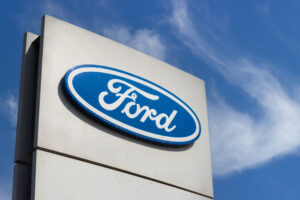
Ford shifts factory workforce away from F-150 Lightning
By onMarket Trends
Ford is shifting two-thirds of its F-150 Lightning factory workforce to other projects as demand for the electric vehicle (EV) does not appear to be meeting expectations, The Detroit Free Press recently reported.
The EV market appears to be in upheaval with some companies, such as Apple, reworking or abandoning EV plans and other automakers, including Stellantis, doubling down on their strategies.
According to the Detroit Free Press, about 700 workers at the Rouge Electric Vehicle Center in Dearborn will be transferred to the Michigan Assembly Plant in Wayne to build the Bronco and Ranger. Another 700 have the option to take a $50,000 retirement package or accept reassignment.
Ford shifted hundreds of workers to the plant to meet customer demand for the F-150 Lightning during the spring of last year, according to the newspaper article. It appears by fall the company was planning layoffs at the factory as EV sales slowed.
The newspaper reports that Todd Dunn, president of UAW Local 862 in Louisville, Kentucky, told union members that the factory’s plans to build 180,000 or more vehicles have been reduced to 55,000.
Ford declined to answer questions the newspaper had about production volume.
John Lawler, Ford CFO, said during the Bank of America Automotive Summit March 26 that the company is turning its focus to smaller EVs.
“The real competition, where we see it, is the low-cost EVs from China, as well as Tesla,” Lawler said. “Of course, we are going to have large EVs as well but they are going to be very limited.”
Lawler said there is more cost in producing larger EVs because a larger battery is needed. He said that not only is the battery more expensive but the weight of the battery creates more costs as well.
Ford is not the only automaker to have a turbulent month with EV production.
Fisker slashed the price of its 2023 Ocean electric SUV to $25,000 on March 27 as it faces bankruptcy.
Edmunds released an article warning consumers not to buy the vehicle, despite the appealing price. The article claims the vehicle is currently in an incomplete state and if the business collapses the issues could never be fixed.
Business Insider reported Thursday it reviewed internal data that shows Fisker had 40,000 of 70,000 reservations for the Fisker Ocean canceled.
The New York Stock Exchange suspended trading of Fisker as its stock fell to $0.09 a share last week while the EV manufacturer also announced a potential deal with a major automaker was terminated.
Earlier in the month, the company announced it would pause production for six weeks as it faced the possibility of its stocks being delisted. It also said it would need to seek protection under bankruptcy laws if it was unable to raise capital to meet its debts.
While Fisker’s shares were dropping, Lucid, another EV automaker, saw its shares climbing nearly 8% as it announced a $1 billion capital injection from an affiliate of Saudi Arabia’s Public Investment Fund, according to Reuters.
The article says the Saudi government has a 60% stake in the company. Lucid claims it will use the funding for corporate purposes and capital expenditures, Reuters says.
Stellantis also announced in recent weeks layoffs of about 400 U.S. workers as it shifts focus to EV production.
The layoffs will mainly impact the engineering, technology, and software departments at Chrysler’s Auburn Hills, Michigan headquarters, according to the Washington Post.
The Washington Post article says CEO Carlos Tavares has claimed the company would have to become more efficient to make the cost of EVs more affordable for the middle class.
BMW also announced recently that it plans to spend more in research and development (R&D) than it ever has before in 2024 with a focus on electrification of its vehicle portfolio, in-car digital innovations, software stacks, and automated driving.
Capital spending is set to peak in 2024 with extensive expansion at Plant Munich and the electrification of the MINI plant in Oxford.
IMAGES
Photo courtesy of Vera/Tikhonova/iStock
